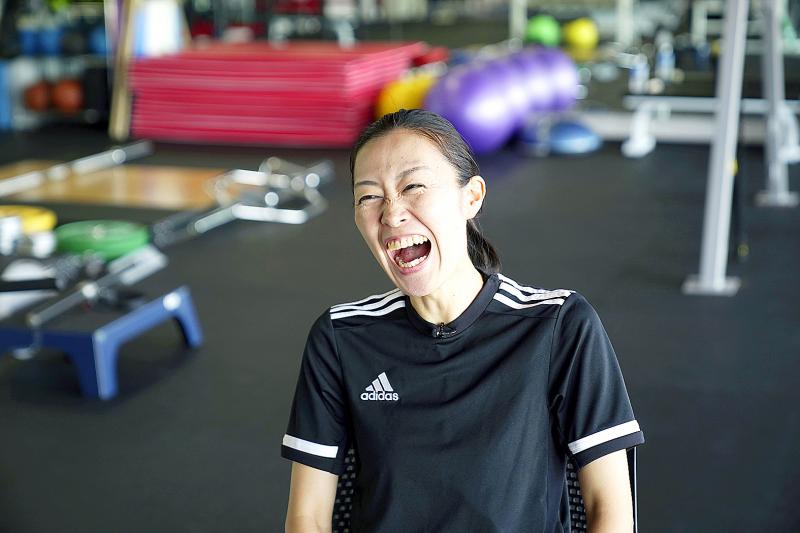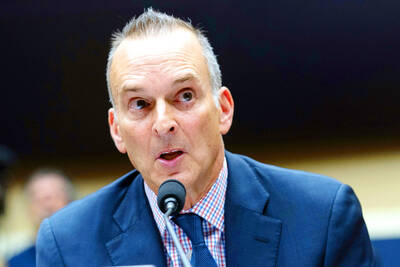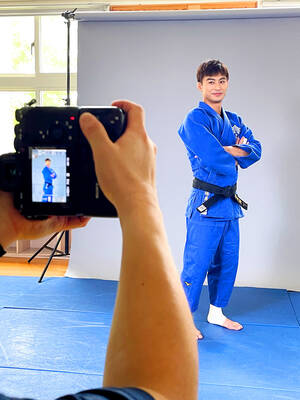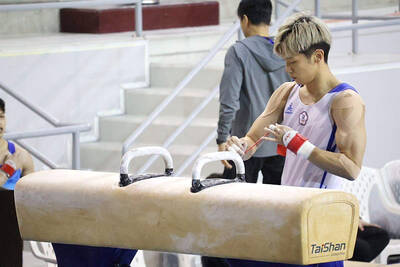Japanese referee Yoshimi Yamashita agrees with Pele or whoever it was decades ago who first described soccer as the “beautiful game.”
Yamashita is one of three women picked to be referees at the men’s FIFA World Cup in Qatar, which opens on Nov. 21. It is the first time a woman would be in charge on soccer’s largest stage.
She sees her job this way: Let the game shine, as it should.

Photo: AP
“One of the big goals as a referee is to bring out the attractiveness of soccer,” she said in an interview in Tokyo on Monday. “I do my best for that, and I will do what I should at that time toward that end. So if I need to communicate with the players, I will do that. If I need to show a card, I will show a card. Rather than control, I’m thinking about what to do toward the big goal of bringing out the appeal of soccer.”
Stephanie Frappart of France and Salima Mukansanga of Rwanda are the other women who were selected. There are 36 referees in total. FIFA has also named three female assistant referees in a pool of 69: Neuza Back of Brazil, Karen Diaz Medina of Mexico and Kathryn Nesbitt of the US.
Although its likely all three are to be in charge of games, it is not a given. They would also be used as so-called “fourth referees” on the sidelines.
However, they cannot be used as assistants.
“Each match official will be carefully monitored in the next months with a final assessment on technical, physical and medical aspects to be made shortly before the World Cup,” Massimo Busacca, FIFA’s head of refereeing, said in a statement.
Yamashita’s selection puts the focus on Japan’s low ranking on most measures of equal pay for women, and in global studies of gender equality.
“I would be very happy if women could play an active role in sports in this way, and if sports and especially soccer could lead this,” Yamashita said. “In Japan, there is still a long way to go in the world of soccer [regarding participation of women], so it would be great if this could connect to promotion of female participation in different ways, not only in soccer or in sports.”
Yamashita went through a workout on Monday just outside Tokyo, sweltering in temperatures that reached 35°C. She laughed when she was reminded that games in Qatar would be much cooler, being played in the Northern Hemisphere winter and in air-conditioned stadiums.
Yamashita seemed relaxed during the interview, removed from the obvious pressure. She has been a referee in Japan’s men’s J League, and has been in charge of the Asian equivalent of the men’s UEFA Champions League. She also handled matches during last year’s Tokyo Olympics.
“Of course, I think the pressure is huge, and I think I have a lot of responsibility, but I am really happy to take this duty and pressure, so I try to take it positively and I try to be happy,” she said.
She described the excitement of leaving the waiting room just before a match.
“I guess it cheers me up in that moment. I feel like that’s when I switch gears the most,” she said.
She said the difference in the men’s and women’s game was, of course, speed, but not simply that some men might run faster.
“It’s the speed, but not just the players’ speed,” she said. “Not the ball speed. It’s just the game speed. It means for me I have to make quicker decisions — more speed.”
Yamashita conducted most of the interview in Japanese, but said she would use English and “facial gestures, body gestures” when communicating with players in Qatar.
“Usually when I give a card, I say nothing,” she said, shifting to English. “But when I give a warning, I just tell them I’m not happy. They understand.”

Revelations of positive doping tests for nearly two dozen Chinese swimmers that went unpunished sparked an intense flurry of accusations and legal threats between the World Anti-Doping Agency (WADA) and the head of the US drug-fighting organization, who has long been one of WADA’s fiercest critics. WADA on Saturday said it was turning to legal counsel to address a statement released by US Anti-Doping Agency (USADA) CEO Travis Tygart, who said WADA and anti-doping authorities in China swept positive tests “under the carpet by failing to fairly and evenly follow the global rules that apply to everyone else in the world.” The

Taiwanese judoka Yang Yung-wei on Saturday won silver in the men’s under-60kg category at the Asian Judo Championships in Hong Kong. Nicknamed the “judo heartthrob” in Taiwan, the Olympic silver-medalist missed out on his first Asian Championships gold when he lost to Japanese judoka Taiki Nakamura in the finals. Yang defeated three opponents on Saturday to reach the final after receiving a bye through the round of 32. He first topped Laotian Soukphaxay Sithisane in the round of 16 with two seoi nage (over-the-shoulder throws), then ousted Indian Vijay Kumar Yadav in the quarter-finals with his signature ude hishigi sankaku gatame (triangular armlock). He

RALLY: It was only the second time the Taiwanese has partnered with Kudermetova, and the match seemed tight until they won seven points in a row to take the last set 10-2 Taiwan’s Chan Hao-ching and Russia’s Veronika Kudermetova on Sunday won the Porsche Tennis Grand Prix women’s doubles final in Stuttgart, Germany. The pair defeated Norway’s Ulrikke Eikeri and Estonia’s Ingrid Neel 4-6, 6-3, 10-2 in a tightly contested match at the WTA 500 tournament. Chan and Kudermetova fell 4-6 in the first set after having their serve broken three times, although they played increasingly well. They fought back in the second set and managed to break their opponents’ serve in the eighth game to triumph 6-3. In the tiebreaker, Chan and Kudermetova took a 3-0 lead before their opponents clawed back two points, but

Taiwanese gymnast Lee Chih-kai failed to secure an Olympic berth in the pommel horse following a second-place finish at the last qualifier in Doha on Friday, a performance that Lee and his coach called “unconvincing.” The Tokyo Olympics silver medalist finished runner-up in the final after scoring 6.6 for degree of difficulty and 8.800 for execution for a combined score of 15.400. That was just 0.100 short of Jordan’s Ahmad Abu Al Soud, who had qualified for the event in Paris before the Apparatus World Cup series in Qatar’s capital. After missing the final rounds in the first two of four qualifier